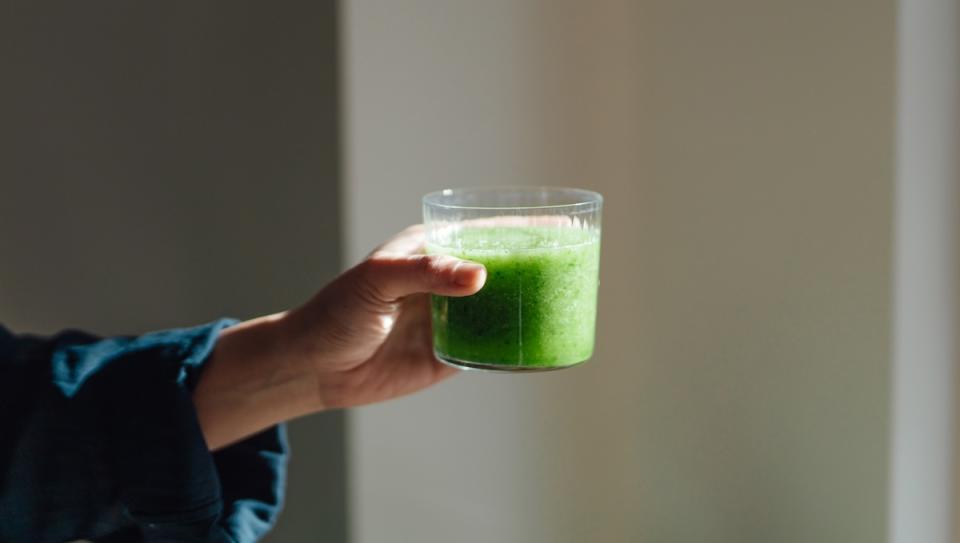The Whole30 Diet: A “Nutritional Reset”
When the concept of a “nutritional reset” comes to mind, many tend to think of juice cleanses or fasts. But the Whole30 diet is a far less invasive, month-long “reset” that gives dieters 30 days of no alcohol, refined sugars, grains, beans, dairy or processed foods — emphasizing only the consumption of “whole” foods.
According to an explainer published to Everyday Health, Whole30 was created in 2009 by sports nutritionists Melissa Urban and Dallas Hartwig, as a “metabolic reset.” It’s viewed as less of a diet and more of a nutritional plan, because it doesn’t involve intense nutrient tracking, exercise or calorie restriction. And because it involves eliminating processed foods and sugars, many have noticed similar benefits to an “elimination diet,” helping people determine certain foods that trigger allergies or unpleasant symptoms upon reintroduction.

Adél Békefi/Getty Images
“When you eliminate foods, then it is definitely a diet, and it can feel restrictive,” Danni Oldfield Venter, RD of Danni Health, tells Woman’s World. “However once you move through the process and reintroduce foods, you then create more of a lifestyle suited to you.”
It Takes a “Prehistoric” Look at the Human Diet
The science behind the Whole30 program takes a deep look at human history. According to an analysis from Live Science, the concept is that humans didn’t historically eat inflammatory foods such as sugars, dairy, legumes, and grains. So removing them will allow the body to “reset” itself, and dieters can decide what foods do and don’t agree with their bodies.
"This 30-day, short term-plan focuses on “real, whole” foods (albeit eliminating grains, legumes, dairy, sugar, alcohol, artificial sweeteners and additives), yet many may think it’s more doable, since it’s not a long-term commitment," Stacey Antine, MS, RDN, of HealthBarn USA told us, explaining that it is more of a way of life as opposed to a diet, as it doesn't focus so much on scales or weight.
Dieters Use It to Figure Out Which Foods Don’t “Agree” With Them

BSIP/UIG/Getty Images
The Whole30 diet can impact one’s body in several ways. Aside from being a “metabolic reset,” by taking a break from any foods our ancestors did not initially eat, it also enables dieters to figure out which foods don’t sit well with them. For example, according to an analysis from Health, the first 10 days after finishing the diet is known as a “reintroduction period,” when dieters start eating food that wasn’t allowed in Whole30. If a reintroduction of any food proves to come with undesirable symptoms like bloating, it can help people eliminate certain foods from their regime, that aren’t serving them.
But Antine disagrees with this method: "Cutting out entire food groups, seems to have grown in popularity, yet it is not supported by evidenced-based research as a more healthful eating pattern," she says. "In fact, you’ll miss many key nutrients."
Many Report Feelings of Rejuvenation, While Others Report Moodiness
Some say that doing Whole30 makes them feel “rejuvenated” in a matter of days. But others, according to an article from Women’s Health, say that during the first two weeks they feel moody, anxious and have reported serious cravings.
In terms of results, may have reported weight loss in week three. But since the diet doesn’t emphasize weight loss or exercise, it doesn’t look that way for everyone.

Bruce Laurance/Getty Images
“Definitely need a support group, or family member to help you to stick to the 30 days, as it is a significant length of time to be restrictive,” Oldfield Venter adds. “Keep a journal, plan your days and meals so that you aren't forced into eating the wrong foods.”
Long-Term, Whole30 Diet Can Help Identify Food Sensitivities and Influence Healthy Habits
Whole30 helps many people recognize certain food sensitivities, which can stave off bloating, digestion issues, and long term, possible unwanted weight gain. Because it can also influence certain healthy habits, per a breakdown on the diet from Healthline, maintaining those habits could help maintain and drive weight loss.
Restrictive Diets Can Backfire, Mentally and Physically
"Restrictive diets can have impacts on mental health regarding eating patterns – since it’s very strict, you must follow the plan exactly or you have to restart at day one," she says. "Being this strict can lead to an eating pattern of restricting, and then binging, and so on, creating a flawed mindset that eating patterns have to be ultra-regimented, or creating the always 'on or off' dieting loop, which many people cycle in and out of."
Depending on What Dieters Remove From Their Diet, It Can Result in Nutrient Loss
Even though Whole30 mainly reduces the consumption of unhealthy products like alcohol, processed foods and refined sugars, it can also lead to possible risks. According to a rebuttal from Business Insider, it can cause indigestion, and those following it can lose certain nutrients, depending on what they’re cutting out. It can also trigger worsened cravings, and depending on what you’re eating, it could be more costly.
“The degree of restriction depends on your intolerance to foods and how many you need to eliminate,” Oldfield Venter says. “Removing daily foods and sometimes food groups is very restrictive.”

vm/Getty Images
"Eliminating entire food groups, namely dairy, legumes and grains is restrictive physically for your body as well – you’ll be missing lots foods that are good sources of fiber, protein, B vitamins, and other key nutrients," Stacey Antine adds.
Whole30 Diet Is Often Pricey, but It Can Also Be Done on a Budget

FG Trade/Getty Images
Most diets will increase the price of any weekly grocery haul, because healthy food is unfortunately more expensive. But the price of a grocery haul on Whole30 will entirely depend on the types of food dieters are buying — per Business Insider, if you’re opting for all organic veggies, it will be more expensive. But mixing in some frozen fruits and vegetables, as well as proteins like eggs and canned salmon, will drive down the prices. Whole30 can break the bank, but it doesn’t have to.
Keeping a Whole30 Grocery Budget Down:
Opt for non-organic versions of “allowed foods.”
Prepare your foods at home, versus using prepared meal services.
Pre-plan grocery list, look for sale items of the allowed foods.
Meal plan and batch cook over the weekend for the days ahead.
The Quality of Life on Whole30 Is Mostly Positive
Even though Whole30 doesn’t allow for sweet treats or a drink at the end of the day, many report feeling more energized and overall healthier, according to Everyday Health. It’s relatively easy to eat at restaurants, compared to other diets, as long as dieters order based on what’s allowed on the Whole30 diet. Overall, quality of life on the diet seems to be relatively untouched, in the grand scheme of diets.
"Keep in mind, that it’s short term," Antine explains. "It is still going to be difficult to follow as it’s very specific and strict, plus, eliminating food groups is restrictive."
It Helps Form New Habits
If done right, a diet like this could help someone eat healthier in the long run. Because in addition to eliminating potentially inflammatory foods, it encourages healthy eating.
"If you’re interested in eating more whole foods, that’s a positive aspect of this plan, so take that piece of it," she says. "Opt for more whole, less-processed foods, which can help you strike an overall balance in your eating patterns."
There Are So Many Delicious Whole30 Recipes to Try

Oscar Wong/Getty Images
Woman's World spoke with produce expert Brianna Shales of Stemilt Growers, who offered a number of fruit-forward Whole30-friendly recipes, below:
This Sour Green Apple Smoothie is perfect for breakfasts on-the-go
The Sheet Pan Cauliflower Gnocchi with Apples and Sausage makes for a simple dinner
Baked Apple Chips are a great crunchy snack
Whole30 Is Designed as a Reset, Not a Permanent Diet
Whole30 is a month-long elimination diet, that has dieters remove dairy, grains, sugars, and alcohol from their daily intake. It is relatively restrictive, so for mental and physical health reasons, dietitians stress the importance of sticking to it no longer than what's recommended (about a month). But it can act as a nutritional reset, and help dieters identify foods that don't agree with their bodies.
How long should someone follow Whole30?
The diet is intended to last for a month. However, it's recommended to consult a doctor before following it.
How long does it take to lose weight on Whole30?
Whole30 is not intended solely for weight loss, as it's intended to eliminate inflammatory foods from one's regular diet. However, you mat lose weight due to the restrictions of the regimen.
What are the side effects of Whole30?
In addition to possibly feeling better by removing certain foods from your diet, it may result in nutrient loss and prolonged cycles of binging and restriction. That said, speaking to a dietitian before starting the diet may be helpful.
Can vegetarians and vegans do Whole30?
Vegetarians and vegans can do Whole30. A plant-based version of the Whole30 program was created in 2022, showing slightly different restrictions (for example, beans on plant-based Whole30 are allowed for a protein source, whereas they usually aren't).
This content is not a substitute for professional medical advice or diagnosis. Always consult your physician before pursuing any treatment plan.
